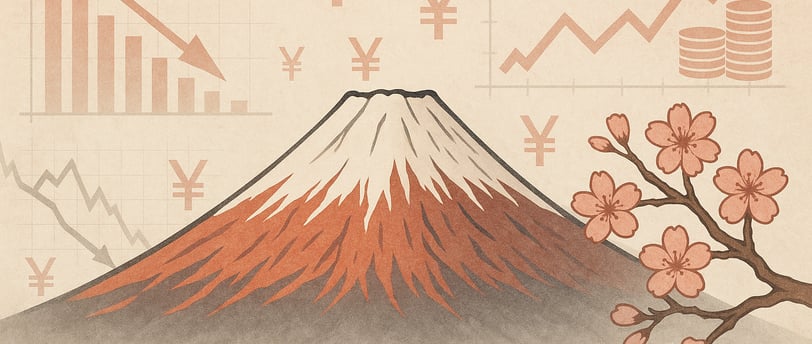Japan's Economic Stagnation: Challenges and Investment Opportunities
Japan has faced prolonged economic stagnation due to factors like low interest rates, massive government debt, and demographic challenges. Despite these issues, the country remains vital to the global economy, influencing financial markets through mechanisms like the carry trade. Moreover, renowned investors such as Warren Buffett have identified promising opportunities within Japan's corporate sector. This article explores Japan's economic landscape, its global significance, and potential investment avenues.
ASIAJAPAN
6/1/20252 min read


Introduction
Japan, once a beacon of rapid economic growth, has experienced decades of stagnation. This period, often referred to as the "Lost Decades", has been characterized by minimal GDP growth, deflationary pressures, and mounting public debt. Understanding the underlying causes and implications of this stagnation is crucial for investors and policymakers alike.
Prolonged Economic Stagnation
The burst of Japan's asset price bubble in the early 1990s marked the beginning of its economic stagnation. From 1991 to 2003, the country's GDP grew at an average annual rate of just 1.14%, significantly lagging behind other industrialized nations. This sluggish growth persisted into the 2000s and 2010s, leading to the term "Lost Decades" to describe this prolonged period of economic malaise.
Low Interest Rates and Massive Government Debt
In an attempt to stimulate the economy, the Bank of Japan (BoJ) implemented ultra-low interest rates and engaged in quantitative easing. These measures led to a significant accumulation of government debt, which, as of January 2025, stood at approximately 263% of GDP, one of the highest ratios among developed nations. The BoJ holds a substantial portion of this debt, raising concerns about the sustainability of such fiscal policies.
Demographic Challenges
Japan's aging and declining population further exacerbate its economic challenges. The population peaked at 128.5 million in 2010 and has been decreasing since, with projections estimating a drop to 87 million by 2070. This demographic shift results in a shrinking workforce and increased social security expenditures, placing additional strain on the economy.
Global Economic Significance
Despite domestic challenges, Japan remains a pivotal player in the global economy. Its financial policies, particularly the maintenance of low interest rates, have facilitated the carry trade—a strategy where investors borrow in low-yielding currencies like the yen to invest in higher-yielding assets elsewhere. This practice underscores Japan's influence on global financial markets.
Investment Opportunities Amidst Challenges
Notwithstanding the macroeconomic hurdles, Japan is home to numerous robust companies that present attractive investment opportunities. Renowned investor Warren Buffett has recognized this potential, investing significantly in Japan's five largest trading houses: Mitsubishi Corporation, Mitsui & Co., Itochu Corporation, Sumitomo Corporation, and Marubeni Corporation. These conglomerates are integral to Japan's economy, engaging in diverse sectors from energy to consumer goods. (theguardian.com)
Investment Vehicles for Exposure to Japan
For investors seeking exposure to Japanese markets, several exchange-traded funds (ETFs) offer diversified access:
iShares MSCI Japan ETF (EWJ): This ETF provides broad exposure to Japanese equities, encompassing a wide range of sectors.
WisdomTree Japan Hedged Equity Fund (DXJ): DXJ focuses on dividend-paying Japanese companies while hedging against currency fluctuations between the yen and the U.S. dollar. (finance.yahoo.com)
JPMorgan BetaBuilders Japan ETF (BBJP): BBJP offers comprehensive exposure to the Japanese stock market, including major holdings like Toyota and Sony. (bankrate.com)
Franklin FTSE Japan ETF (FLJP): FLJP provides low-cost access to Japanese equities, making it suitable for cost-conscious investors. (bankrate.com)
Conclusion
Japan's economic stagnation, driven by low interest rates, substantial government debt, and demographic shifts, presents a complex landscape. However, the country's enduring global economic significance and the presence of resilient corporations offer compelling investment opportunities. Investors, including figures like Warren Buffett, have identified value within Japan's markets, suggesting that, with careful consideration, Japan can still be a fruitful component of a diversified investment portfolio.
Stay updated with finance news and trends.
Contact
info@bullsandbearsblog.com
© 2025. All rights reserved.


